Key takeaways:
- Pro-life advocacy is rooted in the belief in the sanctity of life and involves supporting women at all stages, not solely opposing abortion.
- Engaging in conversations about pro-life issues requires empathy, openness, and a willingness to challenge personal biases and preconceived notions.
- Experiences shared by individuals facing unplanned pregnancies highlight the importance of understanding the complexities behind differing opinions on abortion.
- Listening to opposing viewpoints can lead to personal growth and deeper insights into the human experience, fostering mutual respect even amidst disagreement.
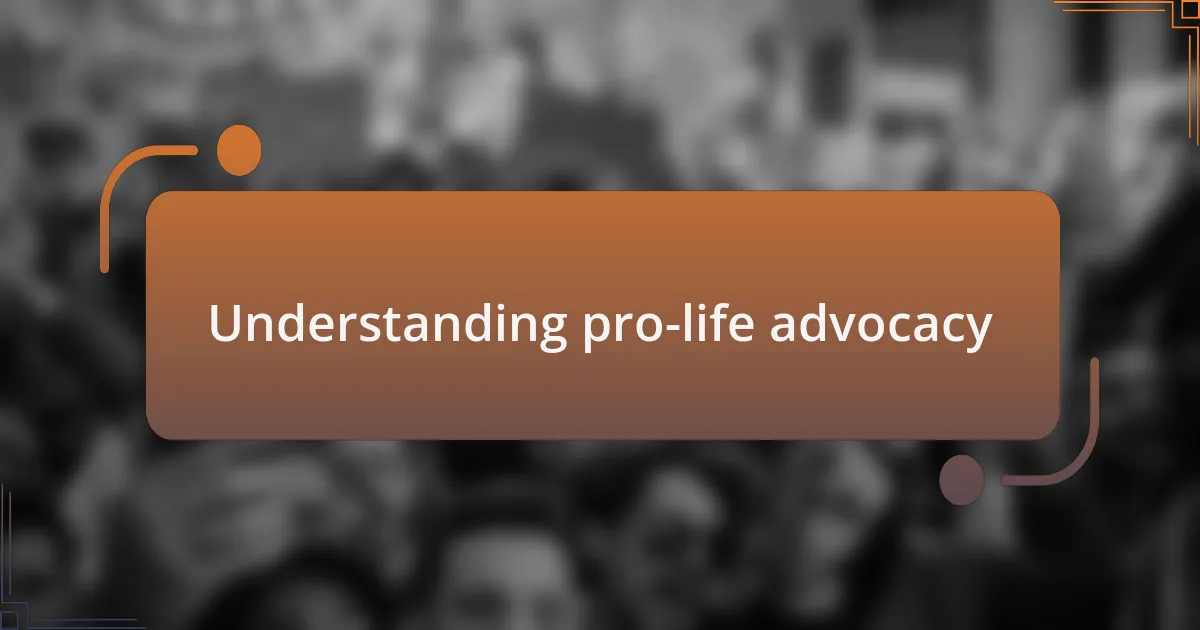
Understanding pro-life advocacy
Pro-life advocacy centers around the belief in the sanctity of life, often rooted in deeply held moral and ethical values. I remember my initial conversations with friends who identified as pro-choice; it pushed me to confront my own beliefs and understand the varied motivations behind this advocacy. Isn’t it fascinating how our life experiences shape our perspectives on such a complex issue?
At its core, pro-life advocacy isn’t just about opposing abortion; it involves a broader commitment to supporting life at all stages. I’ve seen grassroots organizations provide resources for expectant mothers who feel pressured to choose abortion, and it made me realize that advocacy goes beyond protest signs. How many lives could we positively impact if more resources were available to support women in difficult situations?
Engaging with pro-life advocacy requires an openness to dialogue and self-reflection. When I attended a local meeting, I noticed how passionately people shared their stories of hope and struggle, reminding me that behind every statistic is a personal journey. Isn’t it essential to approach this conversation with empathy, recognizing the interconnectedness of our beliefs and experiences?
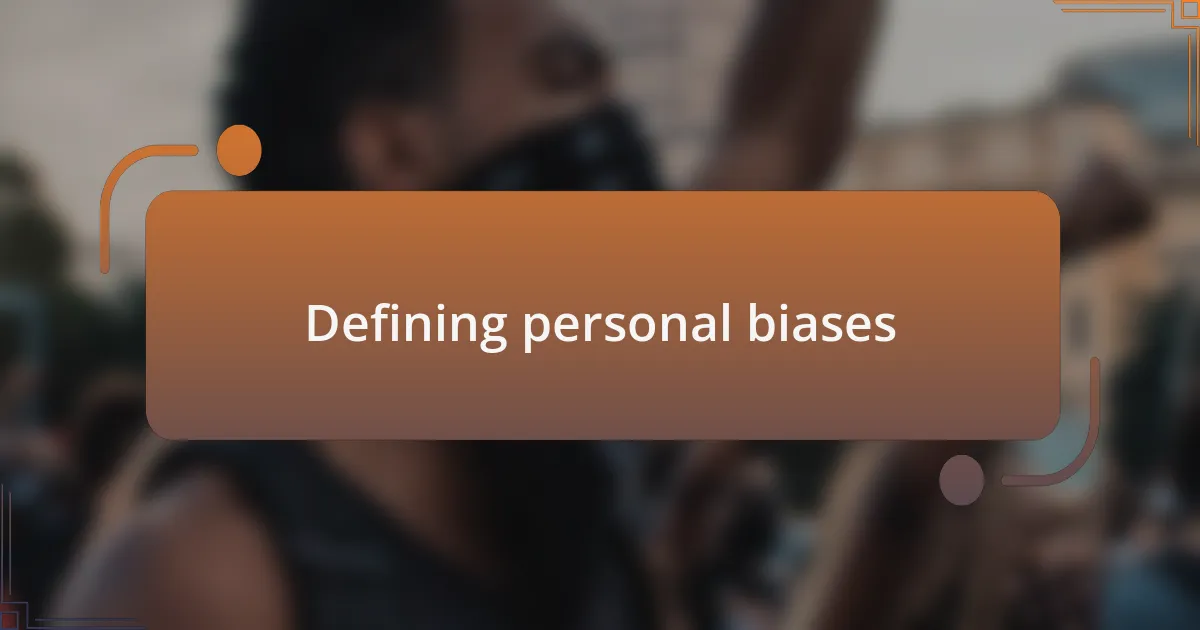
Defining personal biases
Personal biases can be thought of as an invisible lens that colors our perception of the world around us. I often find myself reflecting on the conversations I’ve had about pro-life advocacy, considering how my upbringing and values shaped my viewpoints. Aren’t we all, in a way, products of our circumstances, influenced by those who raised us and the communities we inhabit?
Recognizing personal biases isn’t always easy, especially when they’re intertwined with our identities. I recall a moment during a community discussion when a powerful story challenged my preconceived notions. It was eye-opening to realize how often I projected my assumptions onto others, rather than seeking to understand their unique experiences. How many of us approach sensitive topics with preconceived notions, unknowingly ready to defend our stance rather than engage with new ideas?
Digging deeper into my biases has taught me the importance of humility and openness. I remember a time when I decided to actively listen rather than speak during a debate; it allowed me to see the world through a different lens. Isn’t it striking how just one conversation can shift our perspective and help us uncover biases we didn’t even know existed?
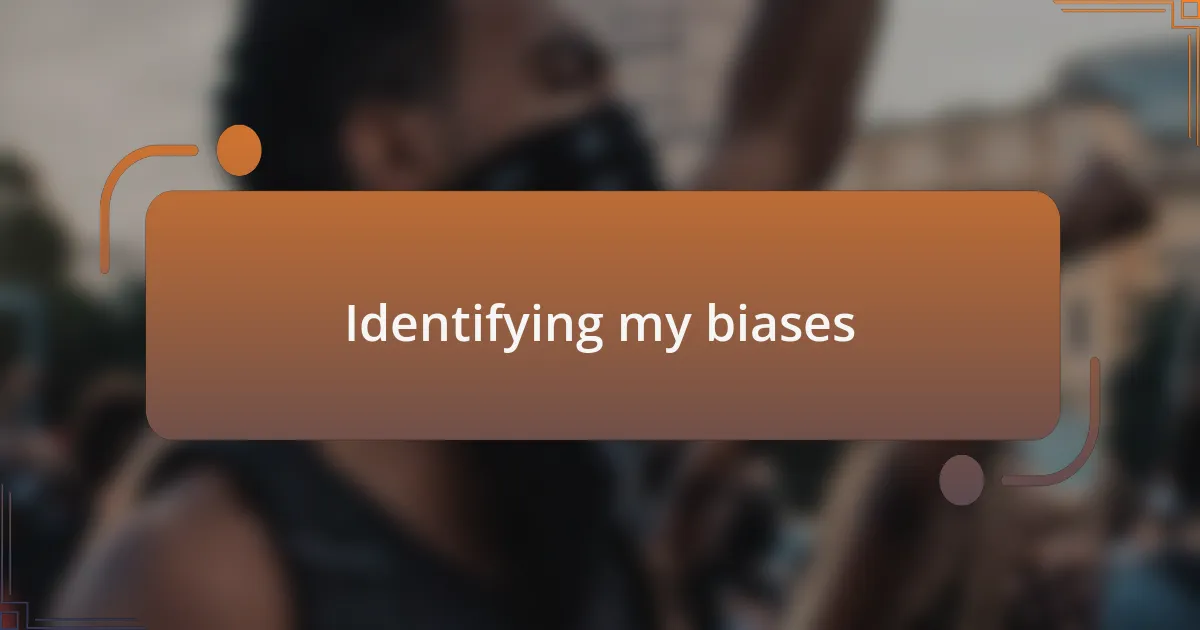
Identifying my biases
Identifying my biases has been a journey of self-discovery that often feels uncomfortable. I remember attending a local pro-life seminar where I realized my initial reactions were clouded by assumptions based on the narratives I had absorbed over the years. Have you ever felt that jarring moment when your beliefs are challenged? It can be disconcerting but also incredibly enlightening.
Reflecting on my experiences, I found that my lens on the pro-life movement was heavily tinted by media portrayals and societal narratives. One impactful conversation with a friend who had a different stance opened my eyes to the lack of nuance in my own beliefs. It made me wonder—what other perspectives had I dismissed simply because they didn’t align with my pre-existing views?
In moments of quiet introspection, I’ve also recognized the emotional weight that my biases carry. There’ve been times when I’ve felt defensive, as if my very identity was being questioned when confronted with opposing viewpoints. How often do our biases hinder our ability to empathize? Acknowledging this has pushed me to confront not just the biases themselves, but the deeper emotions tied to them, paving the way for a more compassionate understanding of others.
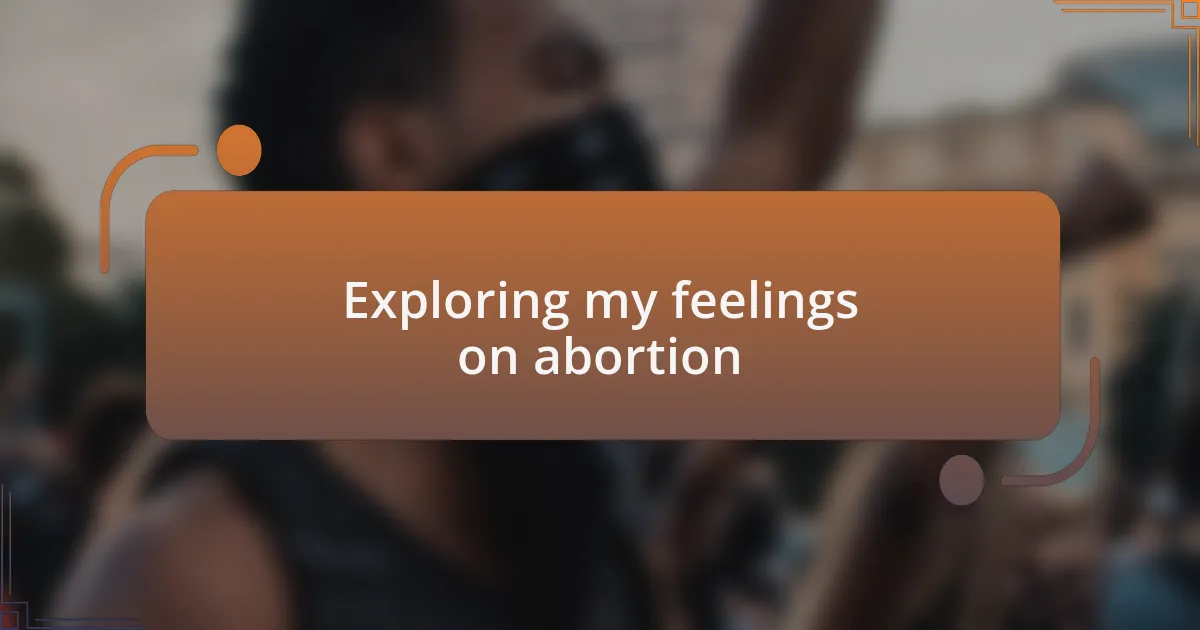
Exploring my feelings on abortion
As I began to explore my feelings on abortion, I was struck by the complexity of emotions involved. I recall a conversation with a family member who shared their own experience with an unplanned pregnancy, which forced me to confront the reality of choices that aren’t black and white. Have you ever realized that behind every opinion lies a personal story? That’s when I began to appreciate the weight of individual circumstances—it wasn’t just a political issue; it was deeply personal.
Navigating my thoughts about abortion often made me feel overwhelmed. I remember sitting alone, grappling with the thoughts of how society views women facing unintended pregnancies. It dawned on me that my earlier views didn’t just stem from a place of belief but were also influenced by fear of the unknown. How often do we let our fears shape our perspectives without truly considering the experiences of others?
There was a moment of clarity when I attended a pro-life rally—what I expected to be a straightforward demonstration turned into a rich tapestry of stories. Hearing testimonies from women who had made different choices sparked a profound empathy within me. It made me question: why had I been so quick to judge without truly understanding the myriad experiences that exist? This experience has continuously nudged me to reflect on the importance of compassion over condemnation in discussions around this sensitive topic.
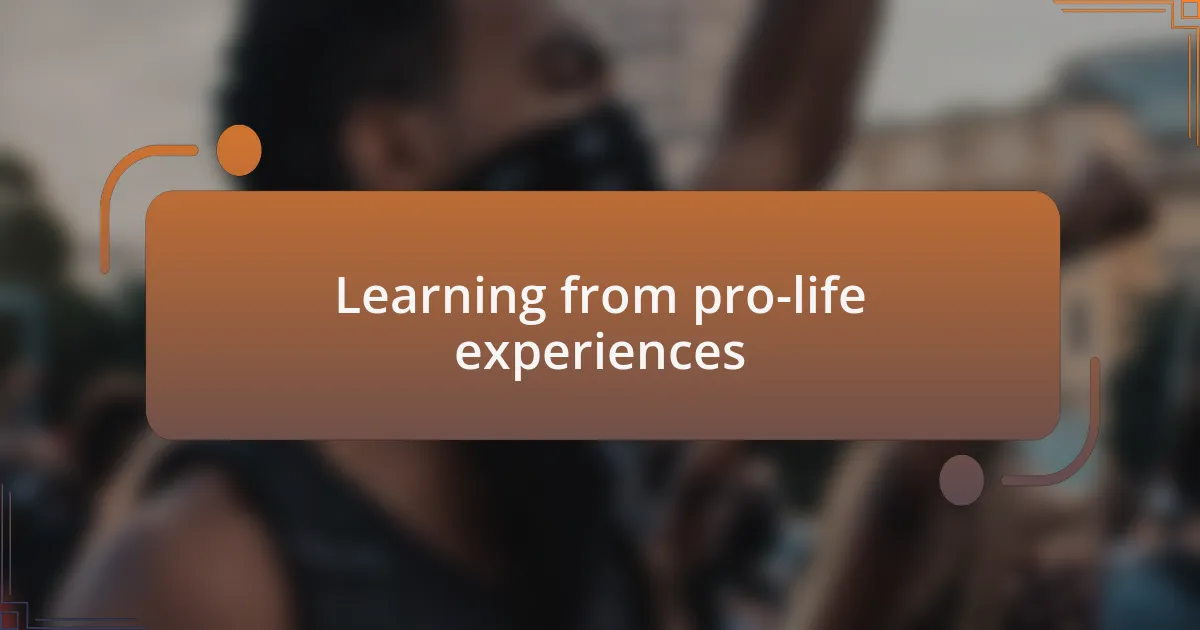
Learning from pro-life experiences
Participating in a local pro-life event opened my eyes in ways I hadn’t anticipated. While I was primarily focused on the overarching messages, it was the individual conversations that truly impacted me. One woman shared how her pro-life choice led her to adopt, a decision that transformed not just her life, but a child’s future. Could I have imagined the ripple effects of one decision if I hadn’t listened to her story?
During discussions with fellow advocates, I realized that biases often stem from misunderstanding. I vividly remember a moment when a participant recounted her struggle with societal expectations and the stigma surrounding her decision. It made me ask myself: how can I challenge my assumptions if I don’t take the time to listen? By embracing these narratives, I learned that every experience carries its own weight, compelling me to reconsider my own biases.
Reflecting on these encounters has underscored the need for empathy in our discourse. For instance, I met a man who shared his journey of becoming an advocate after witnessing the emotional pain of a friend post-abortion. It struck me that everyone carries their unique journey, filled with lessons that could reshape our views. Isn’t it essential to appreciate that each story not only informs the person sharing it but also has the power to transform those who listen?
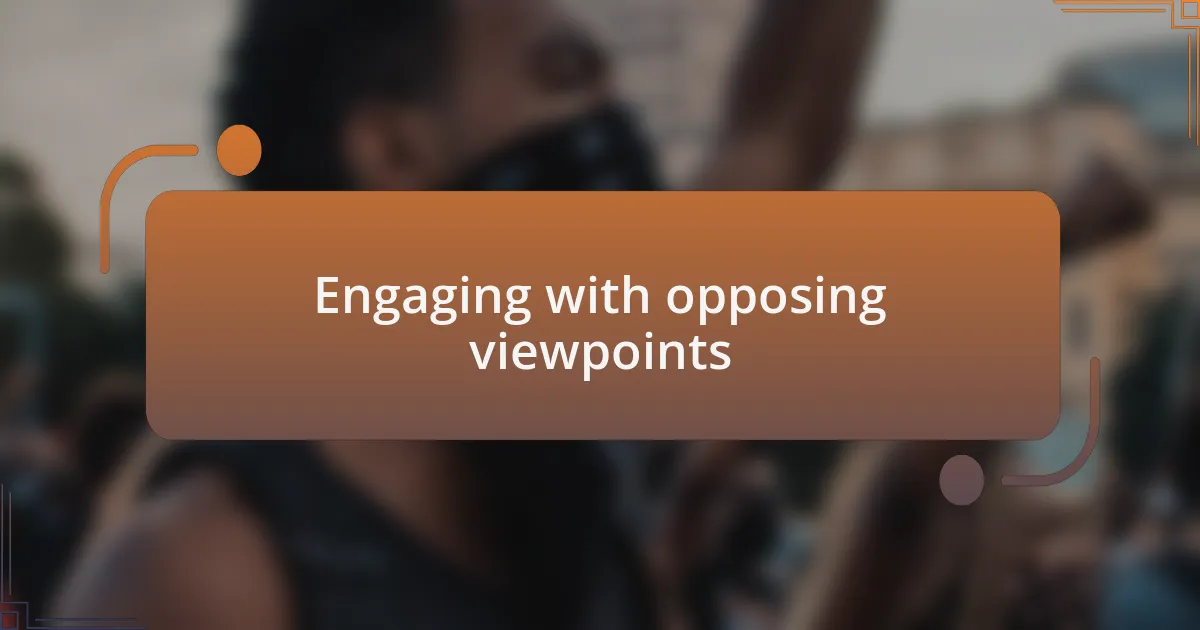
Engaging with opposing viewpoints
Engaging with opposing viewpoints is often where the real growth happens. I recall a time at a community panel where a passionate advocate for reproductive rights challenged my perspective. Instead of escalating into a debate, I chose to ask questions about her experiences. Hearing her articulate the complexities of her choices opened a door for me to see beyond my own beliefs, highlighting how vital it is to create space for understanding.
Sometimes, a simple conversation can yield profound insights. After a heated discussion with a friend holding a contrasting opinion, I took a step back and reflected on her viewpoint later that night. It struck me that listening deeply to her concerns didn’t dilute my pro-life stance; rather, it enriched my understanding of the human experience. Have you ever thought about how meaningful it is to dive into someone else’s story, even if it’s challenging to your beliefs?
Engaging with opposing viewpoints requires not just listening but also vulnerability. I remember a workshop where we were encouraged to share not only our opinions but also our fears surrounding those opinions. I admitted my worries about being judged for my beliefs. In return, others opened up about their own insecurities. This sharing created an environment of mutual respect, proving that vulnerability can lead to authentic connections, even amidst disagreement. Isn’t that worth pursuing?